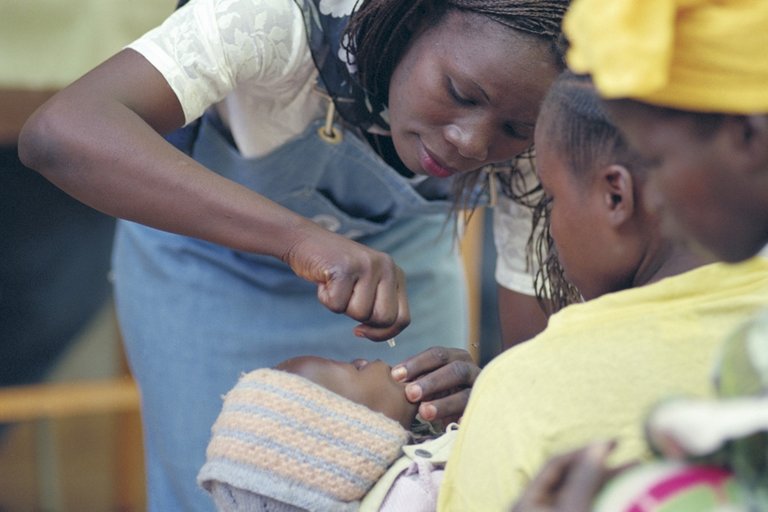I keep learning about different things every day from different platforms, and some of the things I hear about consistently keep me in awe. Sometimes, I wish we totally live a life of complete wholeness without sickness or infection of any sort, but unfortunately, we have these infections around, we just have to try our best to protect ourselves from them (those we can).
Today, I will be writing about poliomyelitis, this is a disease that is caused by poliovirus. I used to think poliovirus affects just children, I mean, isn't that the reason why we get polio vaccination for children? But, it isn't only for children as adults could get affected by this disease as well.

Image source
Poliovirus comes in three variations, we have wild poliovirus type1,2, and 3. Wild polio types 2 and 3 no longer exist and type 1 only still exists in very few areas of the world, it is this type 1 that would most likely cause paralysis.
If you are more familiar with the term POLIO than poliovirus, that is because polio is the name of the disease caused by poliovirus. Polio can affect the body in different ways, the outcome depends on the area the virus attacks and multiplies on the body.
Here is how polio works, it enters into the body through the nose or mouth, then reproduces itself in the throat and gut. Sometimes, it could find its way into the brain and spinal cord, therefore causing paralysis. Paralysis could affect the legs, arms or even the muscles that control breathing.
Image source
The different types of polio include;
Paralytic poliomyelitis is used to describe a situation where poliovirus attacks the brain and spinal cord. It can paralyze the muscle that allows for breathing, speaking, swallowing, and movement of the limbs. It is either called spinal or bulbar polio, depending on the affected part of the body. It is also possible for spinal and bulbar polio to appear together.
Non-paralytic poliomyelitis, could cause aseptic meningitis, which is a dangerous swelling of an area around the brain, in this case getting hospitalized may be highly required. Starts with fever-like symptoms and after a few days other symptoms follow like; severe headache, sensitivity to light, pains in the arms and legs, and neck stiffness.
Polio encephalitis is a rare type of polio that affects infants most times, and when it happens to them, it causes brain swelling. It comes with symptoms like anxiety, difficulty focusing, fatigue, and seizures.
Abortive poliomyelitis creates flu-like and intestinal symptoms that only last for a few days, and would most likely not cause any severe problems. The symptoms that accompany this type of poliomyelitis are similar to several other illnesses, they only start 3-7 days after infection and last for only a few days. It comes in the form of sore throat, constipation, headache, fatigue, fever, and vomiting
Image source
- Post-polio syndrome is when the symptoms of polio return After years of a supposedly resolved polio infection.
Thank goodness for available vaccination now, but not everyone has been vaccinated against polio, so you are more at risk if you have not been vaccinated, or you live in an area with poor sanitation, children below the age of 5 are also at risk here, pregnant women, and those who stay in regions where polio hasn't been eradicated.
I think several illnesses and diseases could be prevented through basic proper hygiene, it is surprising to learn that the spread of the polio disease could be prevented through the practice of healthy hygiene. Let me tell you why I say so, here are the ways polio can be spread.
Consumption of contaminated water
Failure to wash hands after going to the bathroom or touching poop.
Swimming in contaminated water.
Being in close contact with a person who has polio.
Consuming food that has been touched with contaminated water.
There is no particular medication for the treatment of polio, in the case of paralytic polio, physical therapy would be done. In a case where breathing muscles have gotten weak or paralyzed, there would be a need for a mechanical ventilator that would aid breathing.
Some polio cases could result in complications, where the affected person has permanent paralysis, chronic pain, post-polio syndrome, and muscle shortening that leads to deformed joints or bones.
I see no reason why a parent should deny their child/children the opportunity of getting vaccinated.
There is also no cure for polio, the best way to prevent it is simply to get vaccinated. Getting vaccinated often happens in children, I am not sure if an adult can get vaccinated, I guess you would need to ask your healthcare provider for that information.
For Further Studies.
https://www.ecdc.europa.eu/en/poliomyelitis
https://www.mayoclinic.org/diseases-conditions/polio/symptoms-causes/syc-20376512
https://my.clevelandclinic.org/health/diseases/15655-polio
https://www.who.int/news-room/fact-sheets/detail/poliomyelitis
https://www.ncbi.nlm.nih.gov/pmc/articles/PMC4212416/

Hi, I am Tobi, a writer, speaker, relationship blogger, and lover of good music. I love making friends and learning from people. If you want to hear me speak about relationships and general life issues, you can find my YouTube channel where you can watch any episode for free, please do not forget to subscribe, friends. I sincerely appreciate every love I get from here, Kindly do well to keep them coming.

